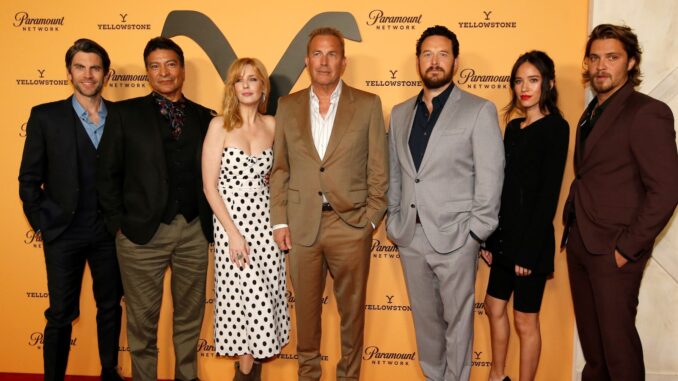
The Roar of the Duttons: What 13 Million Viewers Really Means
Thirteen million. In an era of fragmented audiences, endless streaming choices, and the cacophony of digital content, that number doesn't just represent a viewership record; it's a seismic event, a cultural declaration, and a thunderous roar from the heart of America. When the Season 5B finale of Yellowstone drew 13 million pairs of eyes, it wasn't merely a testament to a hit show; it was an illustration of a profound yearning, a collective search for something epic, authentic, and unapologetically bold in our television landscape.
Imagine the quiet hum of 13 million homes, all simultaneously caught in the grip of the Dutton family’s latest struggle. This isn't just passive viewing; it's a shared breath held in anticipation, a communal gasp, a collective clench of fists as John Dutton, or Rip, or Beth navigates the blood-soaked ground of their Montana ranch. It's the kind of event television that seemed, for a time, to be a relic of a bygone era. Yet, Yellowstone has not only revived it but elevated it, demonstrating that compelling storytelling, when rooted in universal themes and delivered with unflinching grit, can still unite a nation around a single narrative.
What is it about Yellowstone that compels such devotion? To illustrate, consider the show as a modern-day campfire tale, but instead of flickering flames in a clearing, it’s the glow of screens in living rooms across diverse demographics. At its core, it’s a modern Western, a genre that resonates deeply with the American psyche – the rugged individual, the untamed landscape, the eternal struggle for freedom and land. But Taylor Sheridan's genius lies in stripping away the romanticized veneer, exposing the raw, often brutal underbelly of that dream. The Duttons aren't heroes in shining armor; they are flawed, vengeful, deeply loyal anti-heroes who operate by an ancient code in a world trying desperately to modernize. Their battles are not just against land developers and corporate greed, but against their own demons, their own history, and the relentless march of time.
The 13 million viewers are, in essence, tuning into a mirror reflecting a particular facet of the American spirit: the yearning for bedrock truths, for a connection to the land, for the fierce protection of family, no matter the cost. They are drawn to the sweeping panoramas of Montana, where the mountains stand as silent sentinels to generations of struggle. They relate to the visceral anger of Beth Dutton, the stoic loyalty of Rip Wheeler, the complex burdens carried by John. In a world of nuanced complexities, Yellowstone offers a stark, almost primal clarity: you fight for what’s yours, or you lose it.
Furthermore, this record-breaking viewership illustrates a fascinating counter-narrative to the prevailing trends in media consumption. In an age where content is often tailored to hyper-specific niches, Yellowstone has managed to transcend demographics, speaking to both rural and urban audiences, to those who value tradition and those who are grappling with its decay. It's a reprieve from the often-preachy or overtly political narratives, offering instead a story soaked in a different kind of politics – the politics of power, land, and survival. The sheer breadth of its appeal suggests a hunger for television that isn't just entertaining but feels substantial, something with weight and consequence, something that sparks genuine conversation rather than merely fills silence.
The 13 million viewers also signify the enduring power of the linear television experience, even in a streaming-dominated world. For some shows, the communal anticipation of a specific airtime, the shared experience of watching an episode unfold alongside millions of others, creates a cultural moment that binge-watching, for all its convenience, rarely achieves. The Yellowstone finale became an event, a date circled on calendars, a reason to gather, or at least to know that millions of others were experiencing the exact same emotional rollercoaster in real-time.
In the end, the 13 million viewers for the Yellowstone Season 5B finale are more than just a number on a spreadsheet. They are an illustration of a cultural craving for storytelling that is grand, gritty, and deeply human. They represent the resounding success of a show that dares to be exactly what it is – a modern epic, a dramatic exploration of power and legacy, and a vivid tableau of the American West. It’s a powerful reminder that even in our fractured digital age, a compelling narrative can still unite, enthrall, and capture the collective imagination of a nation, proving that the roar of the Duttons echoes far beyond the valleys of Montana.
